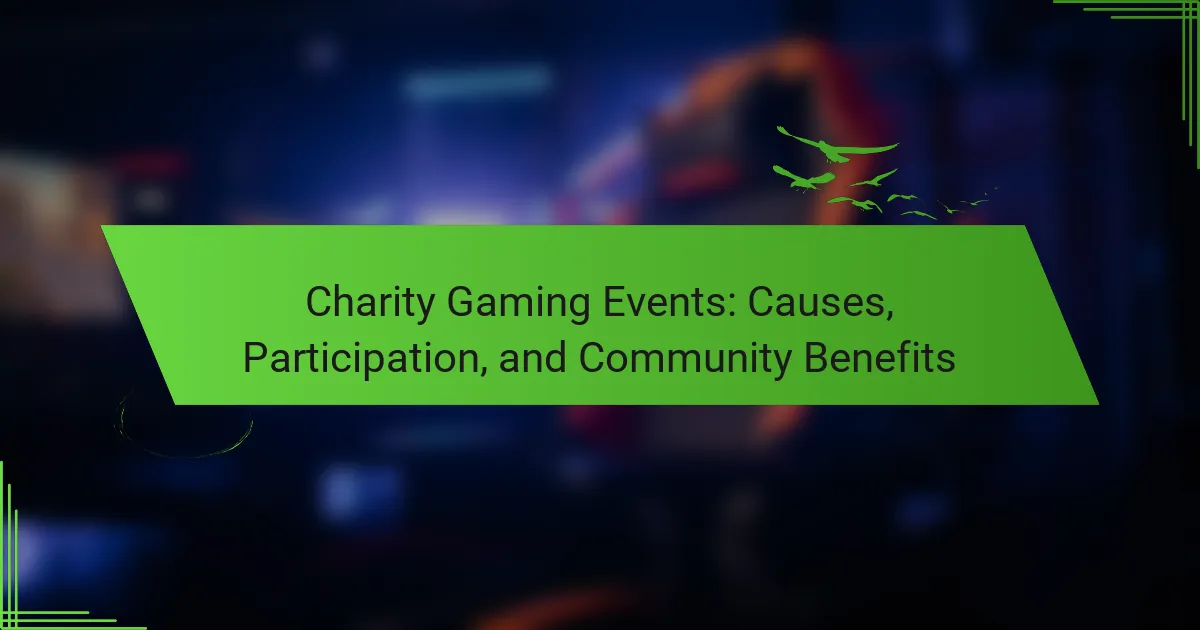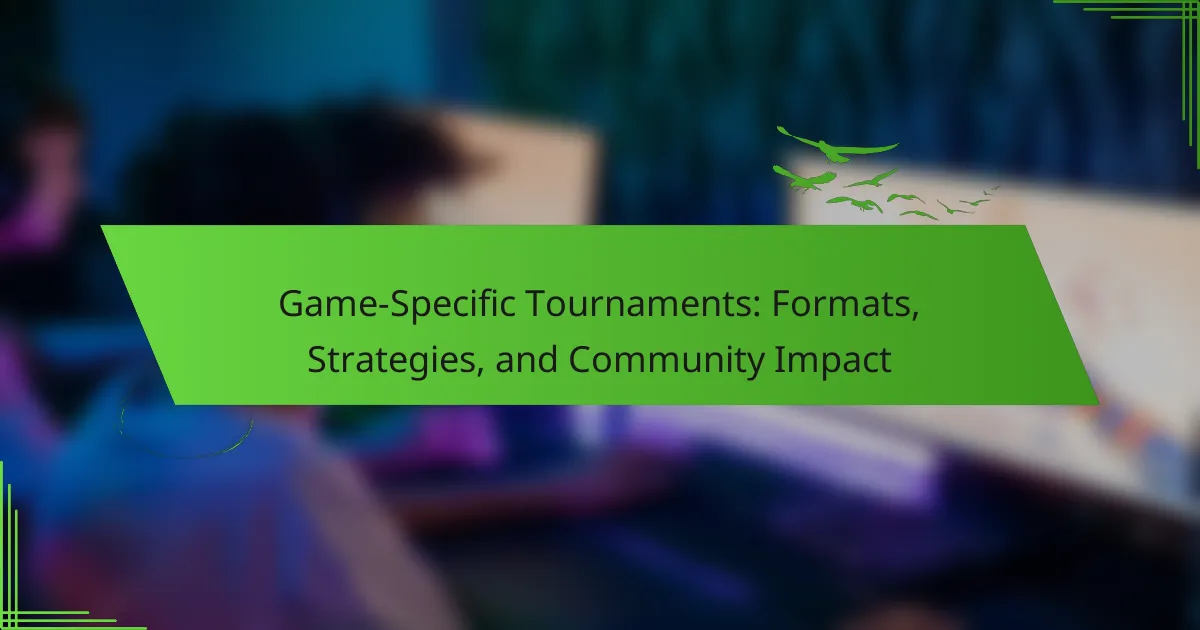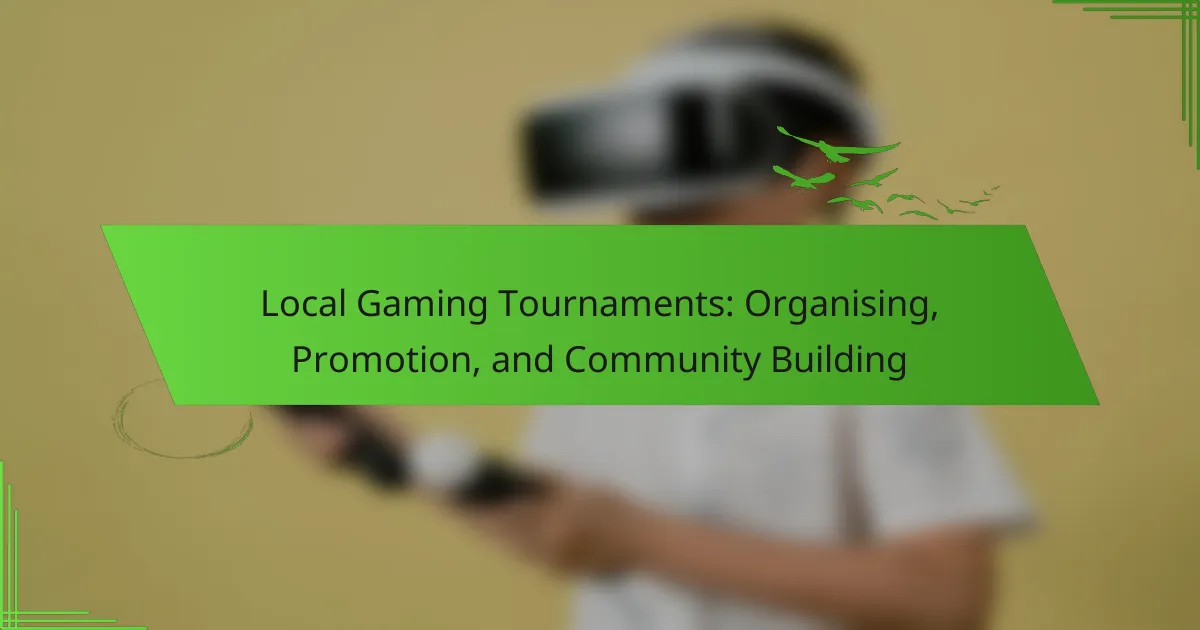Charity gaming events provide a unique opportunity to support important causes while fostering community engagement and social interaction. These events raise funds for health care, education, and animal welfare through various formats like tournaments and auctions. Participants experience fulfillment from contributing to charities and enjoy the competitive atmosphere. Effective planning and engagement strategies enhance their impact and community benefits.
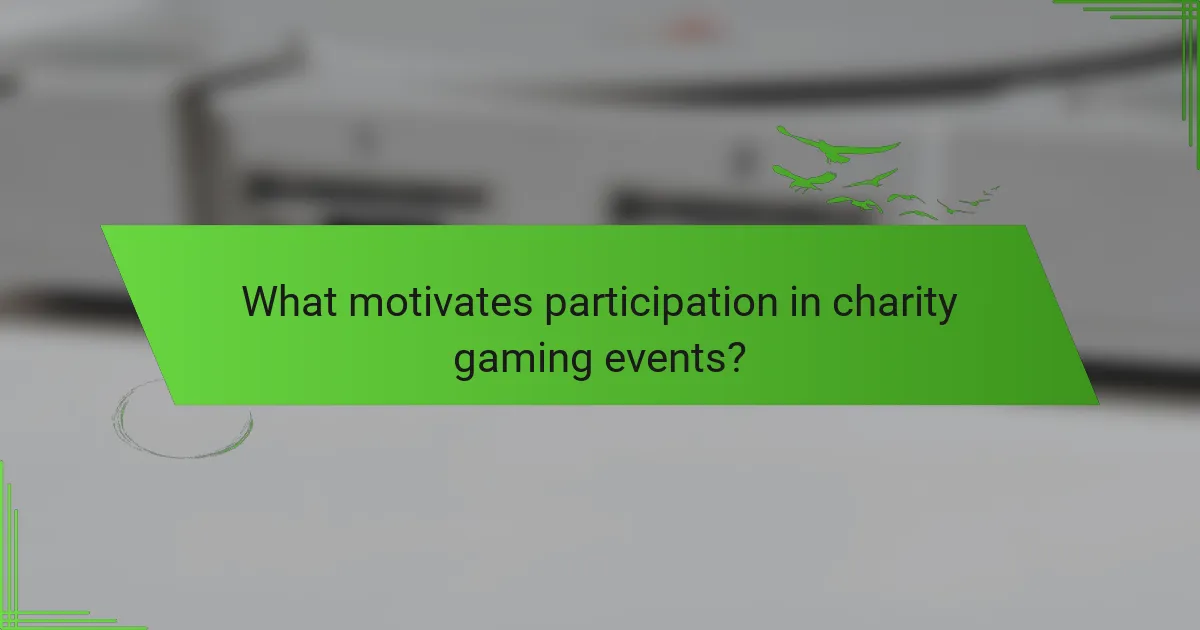
What motivates participation in charity gaming events?
Participation in charity gaming events is motivated by a desire to support causes, foster community engagement, and enjoy social interaction. Participants often feel a sense of fulfillment from contributing to charitable organizations while engaging in fun activities. Additionally, the competitive aspect of gaming can enhance motivation, as individuals seek to achieve personal or team goals. Social networks and peer influence also play a significant role, encouraging involvement through shared interests and camaraderie.
How do personal experiences influence charitable gaming choices?
Personal experiences significantly shape charitable gaming choices by fostering emotional connections to specific causes. Individuals often participate in events that resonate with their personal stories, such as supporting health issues they or loved ones have faced. This connection enhances community involvement and increases fundraising success. Additionally, past participation in similar events can influence future choices, as positive experiences encourage ongoing support. Engaging with friends or family in these activities further solidifies the commitment to particular charitable organizations, creating a cycle of giving and community support.
Which demographics are most likely to engage in charity gaming?
Individuals aged 25 to 44 are most likely to engage in charity gaming. This demographic often combines social interaction with philanthropic efforts, making events appealing. Research indicates that millennials and Gen Z show higher engagement levels in charitable activities, including gaming. Additionally, urban populations tend to participate more due to greater access to events.
What role does social media play in promoting participation?
Social media significantly enhances participation in charity gaming events by increasing awareness and engagement. Platforms like Facebook and Twitter allow organizations to reach broader audiences, share event details, and foster community connections. Social media facilitates real-time updates, encourages sharing among users, and provides a space for participants to interact and share experiences. This engagement can lead to higher attendance and greater fundraising success, demonstrating the unique ability of social media to mobilize support for charitable causes.
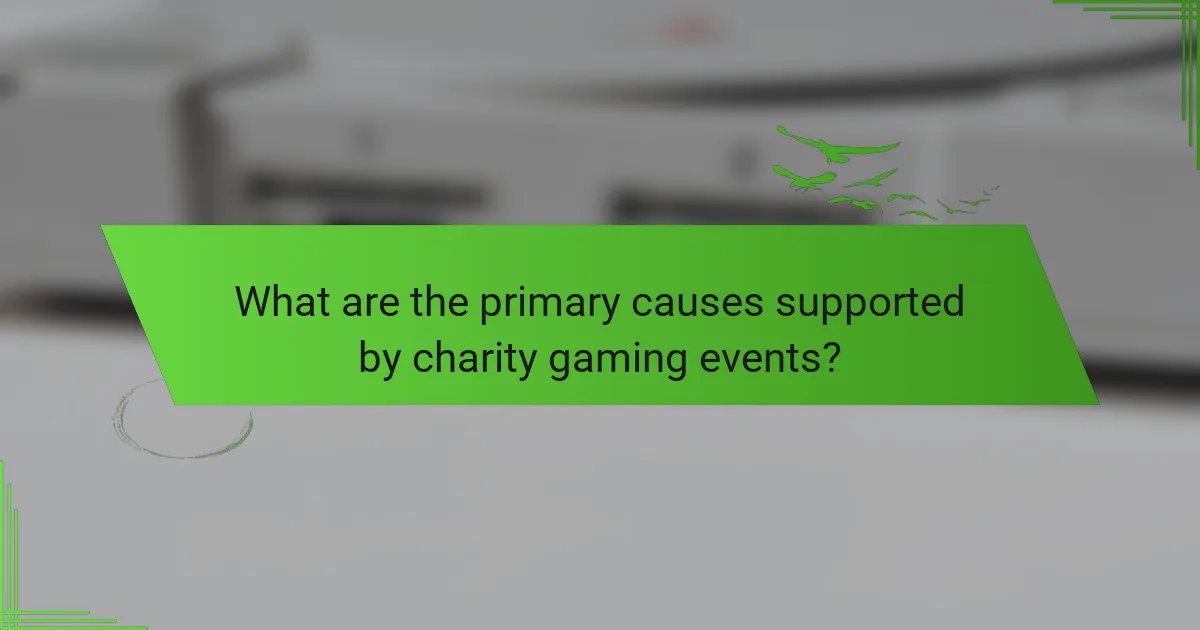
What are the primary causes supported by charity gaming events?
Charity gaming events primarily support causes such as health care, education, animal welfare, and community development. These events raise funds through participation fees and donations, directly benefiting the chosen organizations. For example, funds may assist medical research or provide scholarships. Community engagement is enhanced as participants unite for a common goal, fostering social connections.
How do local charities benefit from gaming events?
Local charities benefit from gaming events by receiving crucial funding and community support. These events attract participants who contribute through entry fees and donations. Additionally, they raise awareness for various causes, enhancing community engagement. Charities can also build partnerships with local businesses, further expanding their reach and resources. Overall, charity gaming events create a positive impact by fostering a sense of community while supporting important causes.
Which global issues are increasingly addressed through gaming initiatives?
Charity gaming events increasingly address global issues such as poverty, health care, education, and environmental conservation. These initiatives leverage the gaming community’s engagement to raise funds and awareness for various causes. For example, events like Extra Life support children’s hospitals, while Games Done Quick raises money for medical research. Participants not only contribute financially but also foster a sense of community and shared purpose. These events highlight the unique ability of gaming to unite individuals for impactful social change.
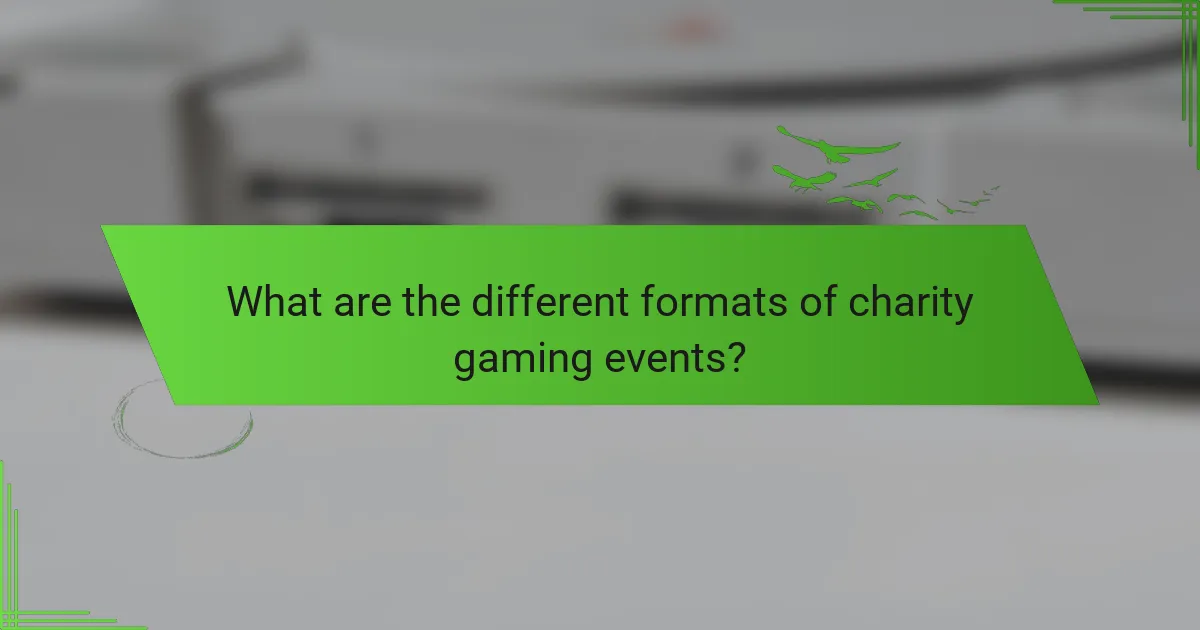
What are the different formats of charity gaming events?
Charity gaming events can take various formats, each designed to engage participants while supporting a cause. Common formats include tournaments, auctions, raffles, and game nights.
1. Tournaments: Competitive events where participants pay to enter, with proceeds benefiting a charity.
2. Auctions: Players bid on items or experiences, with all funds raised directed to charitable organizations.
3. Raffles: Participants buy tickets for a chance to win prizes, generating donations for a specific cause.
4. Game nights: Casual gatherings where attendees pay an entry fee to play games, with proceeds supporting local charities.
These formats foster community involvement and raise funds for important causes.
How do online gaming events differ from in-person gatherings?
Online gaming events primarily focus on virtual participation, while in-person gatherings emphasize face-to-face interaction. Online charity gaming events allow broader participation from diverse locations, increasing fundraising potential. In contrast, in-person events foster community bonding and immediate engagement. Unique attributes of online events include accessibility and convenience, while in-person gatherings provide a tangible sense of connection and shared experience. Both formats contribute to community benefits, but they do so through different mechanisms of interaction and engagement.
Which gaming genres are most popular in charity events?
The most popular gaming genres in charity events include battle royale, first-person shooters, and multiplayer online battle arenas. These genres attract large audiences and encourage community participation through competitive gameplay. Battle royale games like Fortnite often feature fundraising streams, while MOBAs such as League of Legends engage players in team-based challenges for charitable causes. First-person shooters like Call of Duty also host charity tournaments, fostering a sense of camaraderie and support among participants.
What innovative formats are emerging in charity gaming?
Innovative formats in charity gaming include virtual reality experiences, online tournaments, and hybrid events that combine in-person and digital participation. These formats enhance engagement and broaden reach, allowing diverse audiences to contribute. For example, virtual reality allows participants to immerse themselves in themed environments while supporting causes. Additionally, gamification elements, like leaderboards and rewards, motivate participation and foster community spirit.
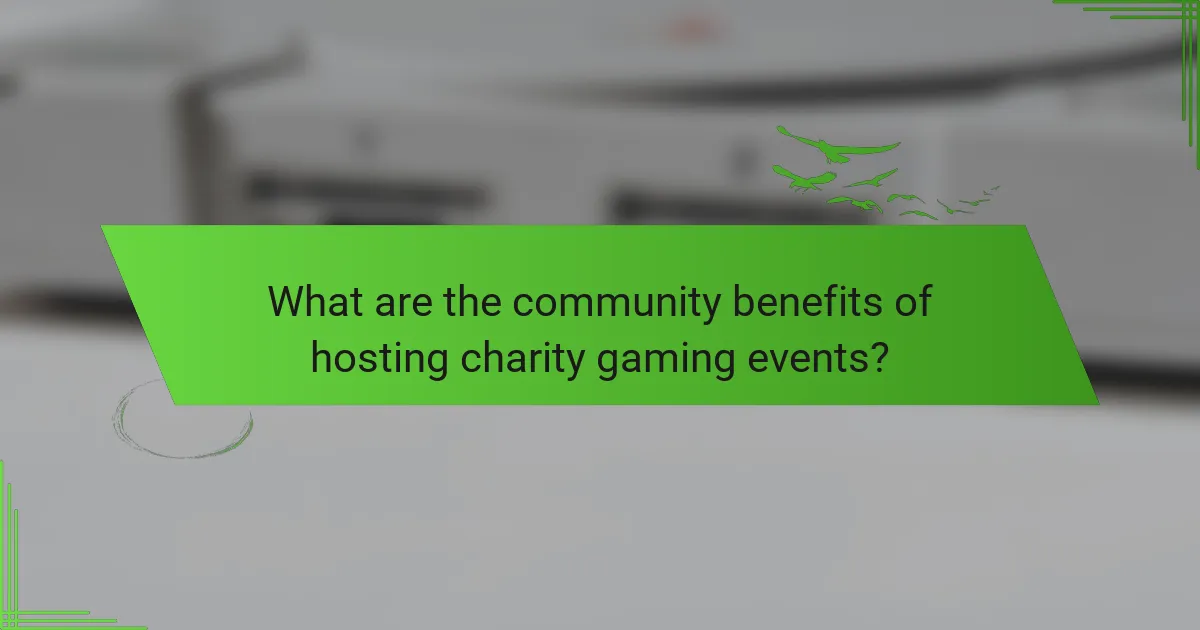
What are the community benefits of hosting charity gaming events?
Hosting charity gaming events provides significant community benefits, including increased social cohesion, funding for local causes, and enhanced awareness of important issues. These events foster connections among participants, creating a sense of belonging. They also generate financial support for charities, which can lead to tangible improvements in the community, such as funding education, health initiatives, and social services. Furthermore, charity gaming events raise awareness about various causes, encouraging community members to engage and contribute positively. This multifaceted impact strengthens the community’s overall well-being and resilience.
How do these events foster community engagement and connection?
Charity gaming events foster community engagement and connection by uniting individuals around a shared cause. Participants often form bonds through collaborative efforts, enhancing social ties and local networks. These events can raise significant funds for various causes, creating a sense of purpose and collective achievement. Engaging in these activities promotes inclusivity, as diverse community members come together to support common goals.
What impact do charity gaming events have on local economies?
Charity gaming events positively impact local economies by generating revenue and fostering community engagement. These events often attract participants who spend on food, lodging, and entertainment, stimulating local businesses. Furthermore, funds raised support local charities, enhancing social welfare. Studies indicate that charity events can inject thousands into small economies, creating jobs and promoting local initiatives.
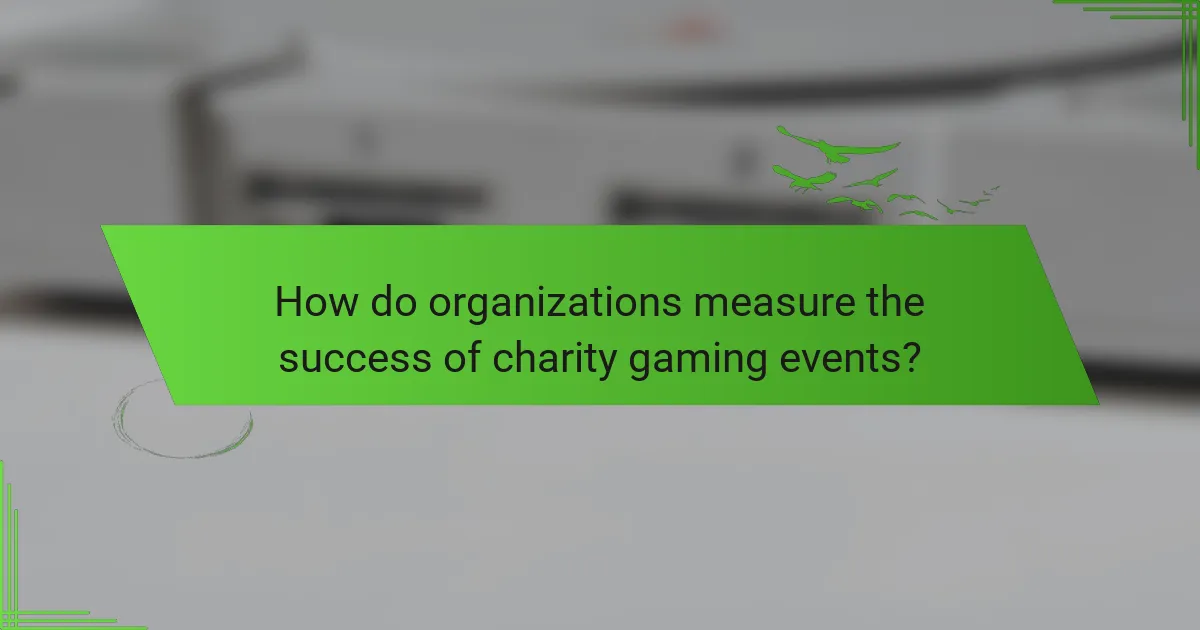
How do organizations measure the success of charity gaming events?
Organizations measure the success of charity gaming events through various metrics. Key indicators include total funds raised, participant engagement levels, and community impact assessments. Tracking expenses against revenue helps assess financial efficiency. Surveys can gauge participant satisfaction, while social media engagement reflects community awareness. Additionally, repeat participation rates indicate long-term success and support for the cause.
Which metrics are most commonly used to evaluate outcomes?
Common metrics for evaluating outcomes in charity gaming events include funds raised, participant engagement, community reach, and post-event feedback. These metrics help assess the overall impact and effectiveness of the events.
| Metric | Description | Value Example |
|————————-|———————————————–|————————|
| Funds Raised | Total donations collected during the event | $50,000 |
| Participant Engagement | Number of attendees and active participants | 300 participants |
| Community Reach | Number of people impacted or reached | 1,500 community members |
| Post-Event Feedback | Satisfaction ratings from participants | 85% positive feedback |
How can organizations improve their fundraising through gaming?
Organizations can enhance their fundraising through gaming by hosting engaging charity gaming events. These events foster community involvement and raise awareness for causes. Participants enjoy a fun experience while contributing to meaningful initiatives, increasing both donations and outreach.
Moreover, incorporating competitive elements, such as tournaments, can boost participation. Collaborating with popular gaming influencers can further amplify visibility and attract a larger audience. As a result, organizations can create a vibrant community around their cause, leading to sustained support and increased funding.
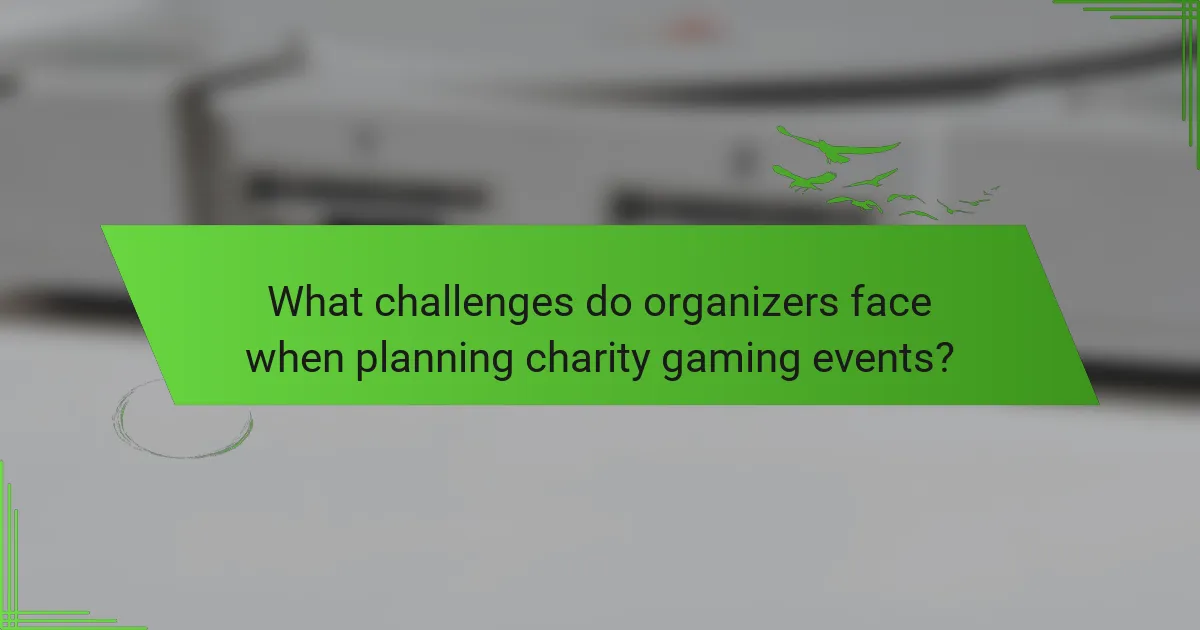
What challenges do organizers face when planning charity gaming events?
Organizers face multiple challenges when planning charity gaming events. Key issues include securing adequate funding, attracting participants, and ensuring compliance with local regulations.
Limited resources often hinder effective marketing and outreach efforts. Additionally, logistical problems such as venue selection and equipment procurement can complicate event execution.
Maintaining participant engagement throughout the event is crucial for its success. Lastly, measuring the impact and success of the event poses a challenge for future planning and improvements.
How can technology enhance the efficiency of event management?
Technology can significantly enhance the efficiency of charity gaming events through streamlined registration, real-time analytics, and improved communication. Digital platforms facilitate easy participant sign-up, reducing administrative burdens. Real-time data collection allows organizers to track fundraising progress and adjust strategies promptly. Enhanced communication tools foster community engagement, keeping participants informed and motivated. These technological advancements lead to increased participation and greater overall impact for charitable causes.
What common pitfalls should organizers avoid?
Organizers should avoid common pitfalls like poor planning, lack of communication, and neglecting participant engagement. These issues can hinder fundraising efforts and community involvement.
1. Insufficient promotion can lead to low attendance.
2. Ignoring legal regulations may result in penalties.
3. Failing to define clear roles can cause confusion.
4. Underestimating costs can jeopardize the event budget.
5. Overlooking post-event follow-up can weaken community ties.
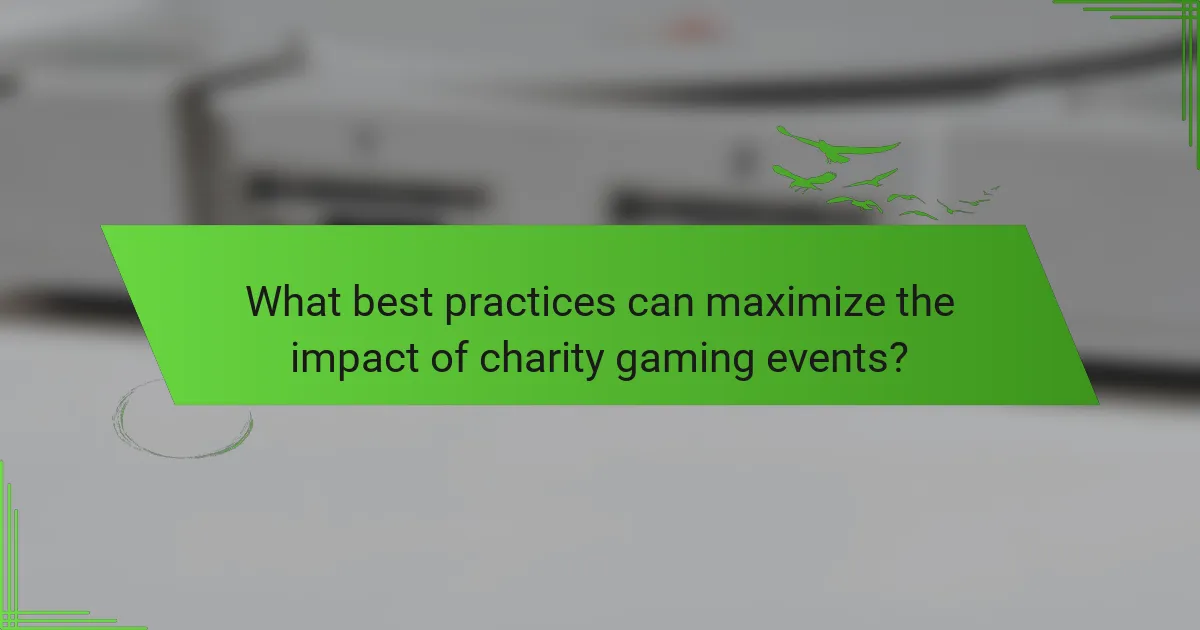
What best practices can maximize the impact of charity gaming events?
To maximize the impact of charity gaming events, focus on effective planning, community engagement, and promotion. Establish clear goals for fundraising and awareness, and ensure the event aligns with a meaningful cause. Engage local businesses and volunteers to enhance support and participation. Utilize social media and local media outlets to promote the event widely, increasing visibility and attendance. Incorporate interactive elements, such as games and competitions, to foster a lively atmosphere that encourages donations.
How can effective marketing strategies boost participation rates?
Effective marketing strategies can significantly boost participation rates in charity gaming events. These strategies create awareness, foster community engagement, and highlight the social impact of participation. By utilizing targeted outreach, social media campaigns, and partnerships with local businesses, organizations can attract a diverse audience.
Incorporating engaging content, such as testimonials and success stories, can further motivate potential participants. Emphasizing the unique attributes of each event, such as exclusive prizes or celebrity involvement, can enhance appeal. As a result, well-executed marketing strategies not only increase attendance but also strengthen community bonds and support for the cause.
What role do partnerships play in successful charity gaming events?
Partnerships are crucial for the success of charity gaming events as they enhance resources and reach. Collaborating with local businesses, sponsors, and organizations provides financial support and increases community engagement. These partnerships can also lead to shared marketing efforts, amplifying event visibility. Additionally, unique partnerships with influential figures can attract more participants, thereby maximizing fundraising potential.
How can feedback from participants inform future events?
Feedback from participants can significantly enhance future charity gaming events by identifying strengths and areas for improvement. This input helps organizers tailor experiences to better meet community needs and preferences.
Collecting feedback through surveys or discussions allows event planners to understand participant satisfaction, engagement levels, and suggestions for new activities or causes. For instance, if attendees express a desire for more interactive elements, future events can incorporate these features to increase participation and enjoyment.
Additionally, analyzing feedback trends can reveal which causes resonate most with the community, guiding future fundraising efforts. Engaging participants in this way fosters a sense of ownership and connection, ultimately benefiting both the charity and the community.
